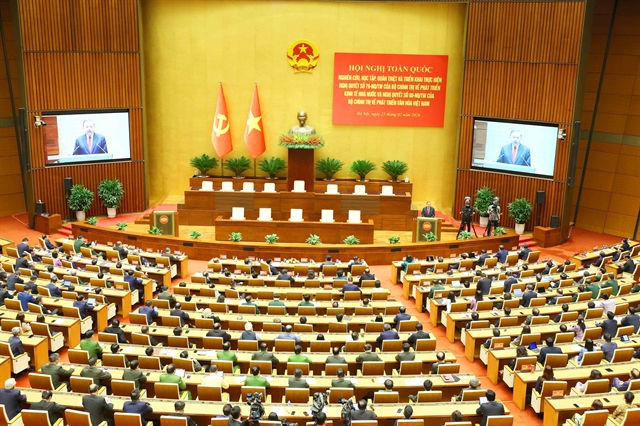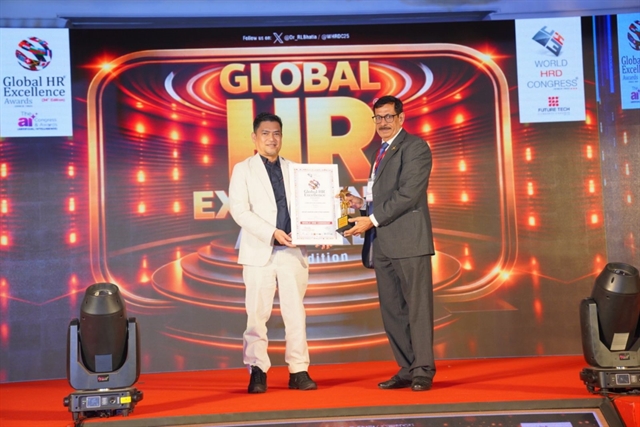 Politics & Law
Politics & Law


|
| Canada’s Ambassador for Women, Peace and Security, Jacqueline O’Neill in Hà Nội on Tuesday. — VNS Photo Minh Phương |
In a recent interview with media, Canada’s Ambassador for Women, Peace and Security, Jacqueline O’Neill talked about the importance of including women's perspectives and experiences in United Nation peacekeeping missions as well as challenges that hinder women’s participation in security mission worldwide.
This is your first official visit to Việt Nam, could you please tell us more about it?
My position in the government of Canada was created about four years ago by the Prime Minister. It's a reflection of the priority that Canada places on the issue of women in peace and security and the great potential for really strong relationships on this issue around the world.
Canada, Việt Nam and many other countries in the world share a number of challenges, especially relating to non-traditional security threats, like climate change and climate emergencies, cybersecurity, trafficking and a whole range of other threats that we are dealing with from a peace and security perspective.
This region is so important to us. Việt Nam has shown leadership in key areas related to women, peace and security and I wanted to visit and learn from Vietnamese colleague and to share some of the experiences that Canada has been having.
There are so many opportunities for us to collaborate and work together to learn from Vietnamese experiences, for us to share Canadian experiences, and for us to continue for both military police and government institutions as well as people to people to share experiences and plans related to peace and security.
By March 2022, 85 out of 193 countries and territories approved a national action programme on women peace and security, why are the remaining countries unwilling to fulfill their commitments and what can UN do to promote women's participation?
There are many countries now that have a national plan for implementing the agenda and the idea of this agenda is that all aspects of peace and security are stronger when women are meaningfully included in making them.
So many countries have developed national strategies and we are close to 105 and it keeps going. Canada has one and we are here in part because Việt Nam has announced that it will be creating a national action plan on women, peace and security.
Many countries are on the path towards creating one. So even they haven’t announced it yet, they are taking meaningful step and what the UN and the rest of us who have plans do is to share experience as many of us are facing the same challenges. Many of us are facing a lot of non-traditional threats so we used to concepts of war involving military and security forces between states and now all over the world we are facing challenges like threats from climate change, cyber security issue, online harassment of women.
What we can do is to share experiences about how we are addressing challenges and what we can do better. By talking about it, more and more countries will see the values in doing it.

|
| Vietnamese female peacekeepers leave for their mission. — VNA/VNS Photo Mạnh Linh |
Why is it important to ensure diversity and include women perspective in peacekeeping?
It's important to achieving the entire mission which includes strengthening relationships with local people. It includes protecting people and to protect people, you have to understand what their priorities are, what their needs are.
In many places where there are peacekeeping missions, it's women who are responsible for collecting water for the family. Sometimes because of conflict, women have to travel further distances to collect water. When keepers understand what women have to do and what risks they face, they can do things like increased patrols around water sources.
They also help build the confidence of the local community in the peacekeepers because when the community can see that the force looks like them, the communities all have men and women, they like their forces, and they see they have men and women, they have more confidence that they're there to be of service and not there for a negative reason.
There are a whole range of other reasons why having men and women serving together is really important.
We don't say women are better at one thing, and men are better at something, we need the diversity, all the perspectives together in one force.
What are gender-based challenges female peacekeepers face while their male counterparts may not?
Some women who've been peacekeepers have said sometimes their male colleagues think that they don't want to be deployed on the most dangerous patrols, or that because they're women, they can't do some of the physical tasks. But they're always very clear that they are there to do the role that every peacekeeper needs to do.
Sometimes there are stereotypes about what women can do physically or risk wise. They say that it's sometimes a challenge to convince even their own colleagues that they want to be treated with that same theme of quality.
How do you assess Việt Nam’s women participating in UN peacekeeping?
Việt Nam is a real leader in contributing to peacekeeping overall. The country is currently exceeding the UN recommended level for the proportion of women who serve.
We have seen around the world that female peacekeepers are able to do the same job that men can do and their presence really strengthened the ability of the peacekeeping force to conduct a whole range of additional functions within the country.
Canada and Việt Nam also share the same challenge of wanting to continue to deploy women to increase our percentages of women and to ensure that we're deploying women at all levels, including the most senior level.
What are your recommendations to support Việt Nam in further increasing women participation?
The challenges that both Việt Nam and Canada face are very similar to each other and they're similar to challenges that women in security forces face all around the world.
I think something that we both know at this stage in our journey is the importance of leadership and the commitment of top leadership to saying we need women in military police deployed on peacekeeping operations.
That commitment is essential. We've seen that both in Việt Nam and Canada. Even with that commitment, there are sometimes challenges or issues within our organisations, our societies that make it challenging for women to deploy.
Virtually every part of the world, including Canada, women's responsibilities for caring for children and the rest of their family is the number one challenge faced.
We have been looking at opportunities for providing childcare, for supporting families to understand more about the value of deploying on peacekeeping and about what circumstances are like.
We have also learned from Việt Nam and from partners in the ASEAN region that you've created networks of women peacekeepers, and that's something that we understand is very important and that we are taking away from this visit as something that we hope to do more. — VNS